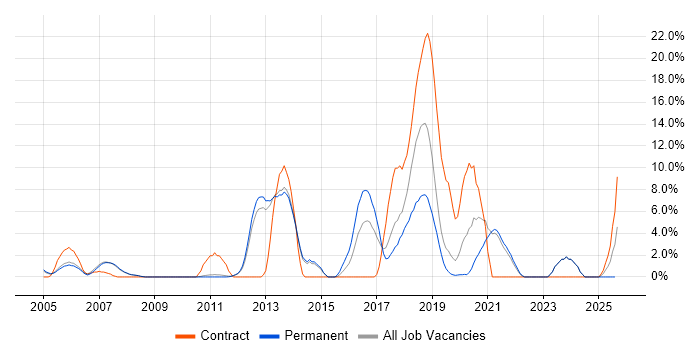Disaster Recovery
Hampshire > Fleet
The table below provides summary statistics and contractor rates for jobs advertised in Fleet requiring Disaster Recovery skills. It covers vacancies from the 6 months leading up to 18 September 2025, with comparisons to the same periods in the previous two years.
| 6 months to 18 Sep 2025 |
Same period 2024 | Same period 2023 | |
|---|---|---|---|
| Rank | 11 | - | - |
| Rank change year-on-year | - | - | - |
| Contract jobs citing Disaster Recovery | 1 | 0 | 0 |
| As % of all contract jobs advertised in Fleet | 4.17% | - | - |
| As % of the Processes & Methodologies category | 4.35% | - | - |
| Number of daily rates quoted | 1 | 0 | 0 |
| Median daily rate (50th Percentile) | £447 | - | - |
| Hampshire median daily rate | £474 | £420 | £675 |
| % change year-on-year | +12.74% | -37.78% | -3.57% |
All Process and Methodology Skills
Fleet
Disaster Recovery falls under the Processes and Methodologies category. For comparison with the information above, the following table provides summary statistics for all contract job vacancies requiring process or methodology skills in Fleet.
| Contract vacancies with a requirement for process or methodology skills | 23 | 18 | 11 |
| As % of all contract IT jobs advertised in Fleet | 95.83% | 100.00% | 100.00% |
| Number of daily rates quoted | 21 | 5 | 2 |
| 10th Percentile | £358 | £480 | £355 |
| 25th Percentile | £402 | £506 | £363 |
| Median daily rate (50th Percentile) | £447 | £575 | £375 |
| Median % change year-on-year | -22.26% | +53.33% | -41.18% |
| 75th Percentile | £450 | £588 | £388 |
| 90th Percentile | £538 | - | £395 |
| Hampshire median daily rate | £525 | £575 | £525 |
| % change year-on-year | -8.70% | +9.52% | - |
Disaster Recovery
Job Vacancy Trend in Fleet
Job postings citing Disaster Recovery as a proportion of all IT jobs advertised in Fleet.

Disaster Recovery
Daily Rate Trend in Fleet
Contractor daily rate distribution trend for jobs in Fleet citing Disaster Recovery.

Disaster Recovery
Co-occurring Skills and Capabilities in Fleet by Category
The follow tables expand on the table above by listing co-occurrences grouped by category. The same employment type, locality and period is covered with up to 20 co-occurrences shown in each of the following categories:
